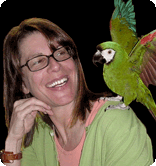Colin’s question: Re-thinking re-homing.

I need some help in finding my parrot a new home in Scotland had him for 9 years. He has just starting pulling feathers out under wing. I had him at vets, was only feeding sunflower seeds, he has been fine for years. He is now getting fruit and veg and 10 days of medicine. I’ve been off work for 3 months, going back in 4 weeks, don’t want to leave him at home anymore. I love him but need help for him to live happy ever after. ps he was a adult when I got him from Glasgow Zoo so cant be sure how old he is. Any help would be great.
Thanks

Dear Colin,
I've asked Gay Noeth to respond to your question. Gay is an instructor for my Living and Learning with Parrots (LLP) course and related lists. She raises small numbers of parrots and disseminates excellent behavior and parrot care information (see http://onafricanwings.com/). Another WPT member in your region will contact you directly with information about re-homing your bird if that's what you decide to do. Gay suggests that you rethink your choice. All best, S.
Hi Colin,
My name is Gay Noeth and I work with Dr. Friedman on her Parrot Behavior Analysis list. I see you have asked for help finding your parrot a new home. While that is really all you asked for help with, I would like to take this opportunity to mention a few other things.
We really don’t know that much about feather destructive behaviors. Does it stem from an underlying medical cause? Does it stem from an underlying behavioral cause? An interesting discussion of the different correlates associated with feather picking can be found at http://www.dds.com/store/files/49/1860827.pdf.
If you are interested in reconsidering re-homing your bird, here are some guiding questions: Are you thinking of re-homing your bird because you feel it is necessary for your situation or are you thinking of re-homing him because you believe that somehow you are failing the bird? Feather plucking shouldn’t make us feel the bird needs a new home. Instead, it may be a call to action. Yes, you need to ensure all medical avenues have been explored, and you might need to take a closer look at the bird's environment to reduce possible stressors (like noise and air quality), or to see if there is someway you can make your bird's daily activities more enriching. There is a great little book written by Kris Porter that she donated to the Internet community called, “The Parrot Enrichment Activity Book.” It can be found right here on the WPT website at http://www.parrots.org/index.php/referencelibrary/behaviourandenviroenrich/. On that same page are some great behavior articles that might help you learn more about your bird's behavior.
You’re already working on changing the diet and there is a good list at yahoo that can help you even more with that aspect of keeping your bird (see http://groups.yahoo.com/group/FeedingFeathers). Many birds do just fine with their caregivers going to work. Even with all these possibilities accounted for, our birds may pluck. Accepting the situation may be all we can do for now. Bottom line, If you are doing all you can, that’s the best you can offer, and that may well be enough from your bird's point of view. A new home won’t necessarily stop the plucking. It’s even possible that the stress of the move could add to it! As you can see, I lean toward keeping birds in their homes whenever possible.
Good luck with your decision,
Gay
http://www.onafricanwings.com

































